QuestionHi,
Yesterday i aquired a male moustache parakeet,from a pet shop.My daughter lives close to and visits quite often. I got him because he was unsellable,So my daughter felt sorry for him and called me,begging me to give him a loveing home,his head is in perfect condition,but his body is nothing but gray down, it seems some other birds decided to use him as a punching bag more or less. They plucked him balled,and am not sure if he didn't do some of it to himself,the owner of the shop wasn't sure either,his owner just took him to the shop and gave him to the owner, giveing no info on why he wanted rid of the bird. I haven't seen him plucking himself,but i have only had him 24 hours. my first question is,if he is doing this to himself,what can be done to stop this? secondly,he is trained somewhat to step up,and does this willingly from shoulder to shoulder or the top of his cage,but when inside his cage he does try to bite. What is the best course i should take with this behavior? he also seems shy to being touched on his head or body,althogh he seems to be very happy and content to sit on my shoulder and keep me company.i believe he was probably miss treated,and took him because i felt he needed a loveing secure home,so now all i need is to be sure i am doing the rite things with him.Any info or suggestions would be greatly appreciated.
Hopeing to hear from you soon! Nikki & My Feathered Friend
Jonah
AnswerHi Nikki and Jonah!
It is great that you are able to give this bird a loving home (that is actually concerned about his welfare!)
Here is a copy of a response I gave to someone else who was concerned about their bird's plucking behavior:
Here is a list of the most common reasons for feather plucking (in no particular order):
1) Stress
2) Disease
3) Poor nutrition (a primarily or all seed diet is VERY bad for birds)
4) Boredom
5) Sexual frustration or hormones
6) Not enough baths (too low of humidity)
Plucking can also become a habit (so, it might have been stress that initially triggered the plucking, but now your cockatoo continues to pluck out of habit). So even if you make sure that all of the above reasons are not applicable to your bird's situation... he might *potentially* still pluck her feathers. It is very unlikely that your bird's feathers are not growing or that they don't have the potential to grow back. A vet might advise the use of a collar to break the habit, or continue to try to distract your bird with lots of different toys (of different materials) and chew things (like bird-safe woods). Pine (as long as it hasn't been sprayed with any pestisides and is clean) is safe for birds to chew on.
For stress- just make sure that your bird is in a peaceful environment and doesn't have lots of loud noises around her all the time. Make sure that she isn't being housed in a round cage (round cages can actually make a bird feel disoriented because they don�'‚¡�'‚¦t' have any corners to retreat to if needed). Make sure she is getting at least 10 hours (preferably 11 or 12 hours) of sleep each and every night. If she is not getting this- you can cover her cage at 8 at night (give or take an hour) and then uncover her cage at 7 or 8 in the morning. This will help keep her cage dark (if you use a dark towel to cover her cage with) and will help her get more sleep each night. Just basically use common sense and make sure that she is comfortable in her surroundings.
For Disease- you would have to see an avian vet about this one. If your cockatoo has not been seen by an avian vet since this plucking has started, you should get him to a vet for a complete exam and chek-up. You can find an avian vet in your area at any of the following websites:
http://www.birdsnways.com/articles/abvpvets.htm
www.aav.org
or
http://www.birdsnways.com/birds/vets.htm
For Nutrition- Make sure your bird is on a healthy, well-rounded and varied diet. Seeds are not that great for birds. They are ok as treats, but don't let them exceed more than 10% of your bird's daily intake of food. Pellets, rice, beans and whole grains should make up the base diet for your bird (around 70 to 80%) and then fruits and veggies should make up about 20 to 30%. Here is a website I have that will go into more details about a good parrot diet:
http://www.geocities.com/pionusparrots/ProperParrotDiet.html
For Boredom- Make sure your bird has lots of toys! :) I usually recommend at least 3 toys (more if your cage is larger) and rotating these toys with "new" toys every couple of weeks. Let�'‚¡�'‚¦s say you have 6 toys in total. You keep 3 toys in the cage. Then after one week, rotate those toys out and the other three toys in. Then next week, do the same thing over again. You can get creative with this and shape it to fit your needs. You can add toys to this mix throughout your bird's life and also throw away toys that have become too old or damaged. I know some people only give their bird one toy, but they change that toy everyday (so the bird has a new toys 7 days a week!) :) Other people (like me) have 6 to 10 toys in their birds' large cages and only rotate these toys every few weeks. It is up to you... but just make sure that your lovebird doesn't have the same toy(s) month after month. Also- getting out of cage time and companionship is very important for a bird's well being. I recommend at least an hour (preferably two or more hours) out of cage time for a lovebird. This should be given on a free-standing play stand or table top play gym. Here is a link to a website all about out of cage time for your bird:
http://www.geocities.com/Conures123/PlayTime.html
For Hormones or Sexual Frustration- This does NOT mean that you should put your bird into a breeding program!!! Sometimes birds will begin to pluck their own feathers out of sexual frustration because they have bonded so strongly with their human companion. This also doesn�'‚¡�'‚¦t mean that they necessarily need an avian companion. For this section (or if this is the reason you suspect why your bird is plucking) I would talk to an avian vet or a professional behavioral consultant. They would have more information in this area than I would.
For Bathing- It is recommended by professionals to bathe your bird as often as she would like. All birds need to bathe to maintain good feather quality. Some birds who don�'‚¡�'‚¦t get baths on a regular basis or who don�'‚¡�'‚¦t get enough humidity in their environment will get dry, itchy skin. This can cause birds to chew their feathers or even pluck them out entirely. There are a couple of different ways to bathe a bird�'‚¡K and different birds will prefer different ways. It is recommended to bathe your bird at least once a week. But if it is an un-enjoyable experience for your bird�'‚¡K. Maybe every other week would be better until she gets used to it and learns that bath time can be one of life�'‚¡�'‚¦s greatest joys! �'†â€™�'‚º Here is a link to an article all about bathing your bird:
http://www.birdsnways.com/wisdom/ww63eii.htm
If you have any other questions/concerns�'‚¡K here is a link to an excellent article that Companion Parrot Quarterly (an excellent parrot magazine) has about feather-destructive behavior:
http://www.companionparrot.com/Basics%20of%20Featherpicking.htm
As far as the biting- you've only had the bird for 24 hours, so there is probably a lot going on, and it is hard to say for sure what is causing him to act this way. However, if he is only aggressive in the cage... he might be territorial over it. Here is an article about cage territorial behavior:
http://www3.upatsix.com/liz/articles/territory.html
Here is another article of interest for you: http://www.parrothouse.com/pamelaclark/secondhand.html
I hope this helps.
-Maggie

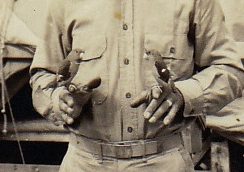 ID Birds
Question
Panama Birds
My uncle served in Panama in 1941
ID Birds
Question
Panama Birds
My uncle served in Panama in 1941
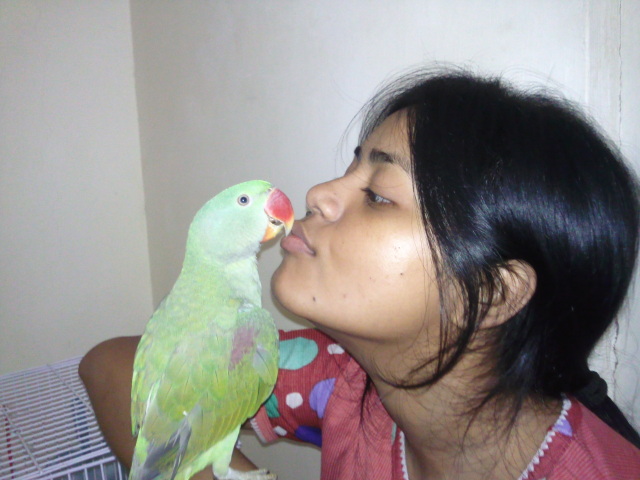 can i give my parrot chole(chana) called in hindi
Question
my little chaddi alexa
dear sir,
can give chan
can i give my parrot chole(chana) called in hindi
Question
my little chaddi alexa
dear sir,
can give chan
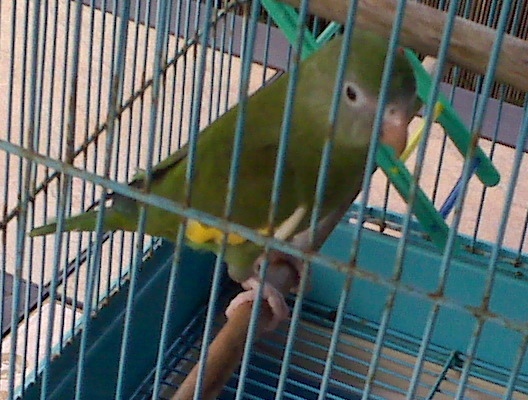 What type of parrot is this?
Question
Friendly bird
A week ago ths small parrot flew
What type of parrot is this?
Question
Friendly bird
A week ago ths small parrot flew
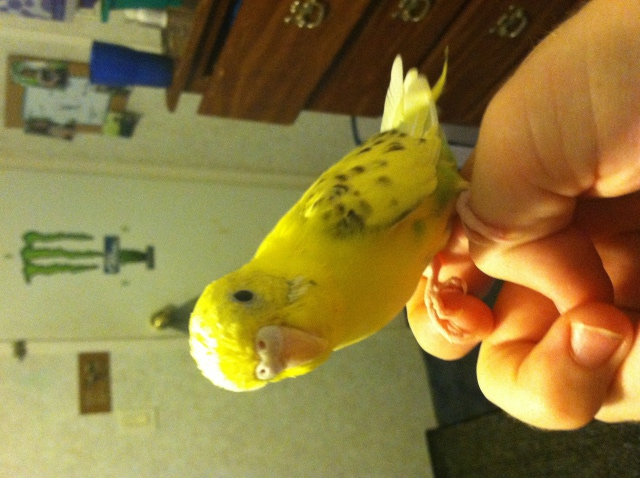 Parakeet gender
Question
Parakeet
Hi, I looked for an expert und
Parakeet gender
Question
Parakeet
Hi, I looked for an expert und
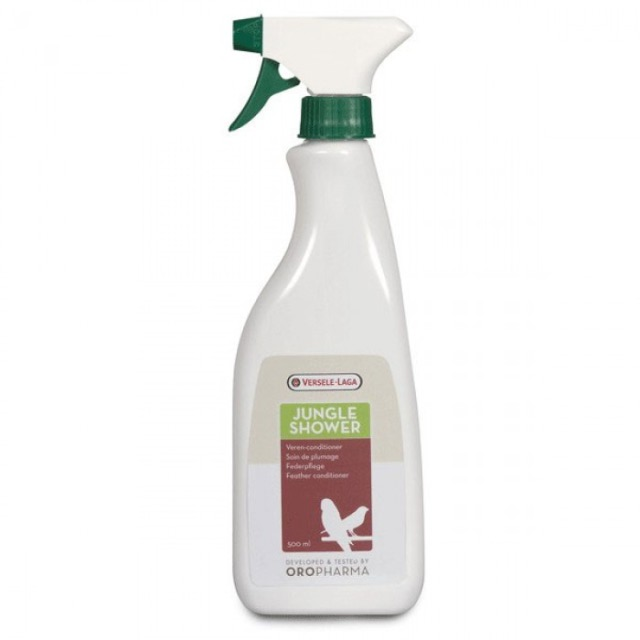 Indian Ringneck Health Issue
QuestionI have an Indian Ringneck who had been neglecte
Indian Ringneck Health Issue
QuestionI have an Indian Ringneck who had been neglecte